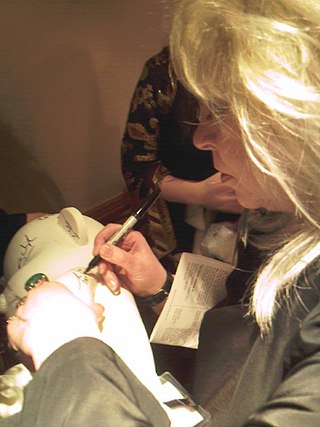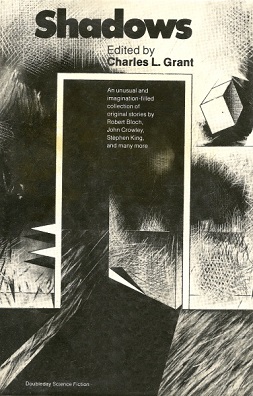
Kim James Newman is an English journalist, film critic and fiction writer. He is interested in film history and horror fiction—both of which he attributes to seeing Tod Browning's Dracula at the age of eleven—and alternative history. He has won the Bram Stoker Award, the International Horror Guild Award and the BSFA award.

Genre fiction, also known as formula fiction or popular fiction, is a term used in the book-trade for fictional works written with the intent of fitting into a specific literary genre in order to appeal to readers and fans already familiar with that genre.
Barbara Hambly is an American novelist and screenwriter within the genres of fantasy, science fiction, mystery, and historical fiction. She is the author of the bestselling Benjamin January mystery series featuring a free man of color, a musician and physician, in New Orleans in the antebellum years. She also wrote a novel about Mary Todd Lincoln.

Tanith Lee was a British science fiction and fantasy writer. She wrote more than 90 novels and 300 short stories, and was the winner of multiple World Fantasy Society Derleth Awards, the World Fantasy Lifetime Achievement Award and the Bram Stoker Award for Lifetime Achievement in Horror. She also wrote a children's picture book, and many poems. She wrote two episodes of the BBC science fiction series Blake's 7 .
Patricia Nead Elrod is an American novelist specializing in urban fantasy. She has written in the mystery, romance, paranormal, and historical genres with at least one foray into comedic fantasy. Elrod is also an editor, having worked on several collections for Ace Science Fiction, DAW, Benbella Books, and St. Martin's Griffin. She self-published a signed, limited edition novel under her own imprint, Vampwriter Books.

Dark fantasy is a subgenre of fantasy literary, artistic, and cinematic works that incorporates disturbing and frightening themes. The term is ambiguously used to describe stories that combine horror elements with one or other of the standard formulas of fantasy.

Shadows was a series of horror anthologies edited by Charles L. Grant, published by Doubleday from 1978 to 1991. Grant, a proponent of "quiet horror", initiated the series in order to offer readers a showcase of this kind of fiction. The short stories appearing in the Shadows largely dispensed with traditional Gothic settings, and had very little physical violence. Instead, they featured slow accumulations of dread through subtle omens, mostly taking place in everyday settings. While Grant himself was very adept at this kind of fiction, he contributed no stories to the anthologies, writing only the introductions and author profiles. The first volume in the series won the World Fantasy Award for Best Anthology.
Locus: The Magazine of The Science Fiction & Fantasy Field, founded in 1968, is an American magazine published monthly in Oakland, California. It is the news organ and trade journal for the English-language science fiction and fantasy fields. It also publishes comprehensive listings of all new books published in the genres. The magazine also presents the annual Locus Awards. Locus Online was launched in April 1997, as a semi-autonomous web version of Locus Magazine.
Thomas Tessier is an American writer of horror novels and short stories. He has also written poetry and drama.

Ellen Datlow is an American science fiction, fantasy, and horror editor and anthologist. She is a winner of the World Fantasy Award and the Bram Stoker Award.
Jane Gaskell is a British fantasy writer.

Phyllis Eisenstein was an American author of science fiction and fantasy short stories as well as novels. Her work was nominated for both the Hugo Award and Nebula Award.

Lisa Gracia Tuttle is a British science fiction, fantasy, and horror author. She has published more than a dozen novels, seven short story collections, and several non-fiction titles, including a reference book on feminism, Encyclopedia of Feminism (1986). She has also edited several anthologies and reviewed books for various publications. She has been living in the United Kingdom since 1981.
Lois Tilton is an American science fiction, fantasy, alternate history, and horror writer who has won the Sidewise Award and been a finalist for the Nebula Award. She has also written a number of innovative vampire stories.
Jessica Amanda Salmonson is an American author and editor of fantasy and horror fiction and poetry. She lives on Puget Sound with her partner, artist and editor Rhonda Boothe.
Del Howison is an American horror author, editor and actor.

Elder Signs Press, Inc is a Michigan-based book publisher distributed through the Independent Publishers Group. It specializes in horror, science fiction, and fantasy titles.
William B. Fawcett is an American editor, anthologist, game designer, book packager, fiction writer, and historian.
This is a list of fiction works by Chelsea Quinn Yarbro, who was awarded a 2009 Bram Stoker Award for Lifetime Achievement. Quinn Yarbro has published under her name and under the pseudonyms of Quinn Fawcett, Trystam Kith, Terry Nelson Bonner, Camille Gabor, and Vanessa Pryor. Quinn Yarbro has also written non-fiction history works under the name of T. C. F. Hopkins.

The Secret History of Vampires is an anthology of original fantasy/horror historical short stories edited by American writer Darrell Schweitzer. It was first published in paperback by DAW Books in April 2007.










